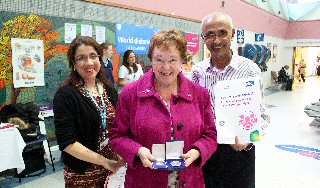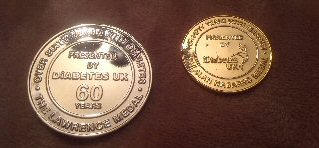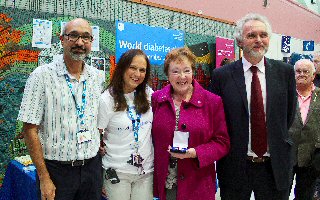|
People 'don't trust'
NHS with personal data
MORE than a 3rd of people do not trust
the NHS with their personal information through fears it could be lost, stolen
or handed to private companies, a poll has found.
A total of 56% of the 2,000 people surveyed in the inaugural National Personal
Data in Research Survey would also stand in the way of advances in medical
science by not allowing their data to be shared for research.
Experiences of sharing details with the health service and attitudes towards
taking part in research have been laid bare in the survey commissioned by a
European wide campaign called:- 'eTRIKS' to increase the sharing of patient data
among studies, which is calling for a new "smarter approach" to the collection
of research information.
The project is looking to improve the reuse of medical research data.
When asked if respondents trusted the NHS with their personal data, 64.35% said
they did but 19.65% were unsure and 16% said they did not.
Only 43.70% would be happy to share their medical data in the pursuit of
research, yet 26.25% said they would not hand over their details and 30.05% were
not sure.
Also, a total of 21.6% said their personal data had been shared without their
apparent consent, while 38.15% were unsure and 40.25% said that their details
had not been taken.
The eTRIKS project; a collaboration between 17 partners, including leading
pharmaceutical companies, research organisations and Universities; is now
urging a new culture of greater willingness to support medical scientists.
It comes after a data sharing event which took place at the EU Parliament on 20 October 2016.
Research standards expert Paul Houston, co-lead for the eTRIKS standardisation
initiatives and Head of Operations for CDISC Europe Foundation, a not-for-profit
organisation campaigning for standards in research data, said:- "Medical
research continues to provide more and more breakthroughs, resulting in
improvements to the lives of millions of people across the world. However,
in 2012 there were an estimated 8.2 million deaths from cancer in the world, but
with more research further medical breakthroughs, including cures to cancers and
other long-term conditions, could be possible. We want to create a new culture
of openness in research, making the sharing of data much easier and opening up
more opportunities to pursue medical advances. But to support our new smarter
approach to research, we also need a new culture where research participants and
the general public understand and are part of the solution."
As part of the eTRIKS, a patient engagement event on the value of data will be
staged on October 20 at the EU parliament to help assure the value of medical
research data.
The project is supporting researchers to make the most out of the medical
research data they generate by making it easier to combine and use data
collected from different studies with new ones.
This is being done through the provision of open source software, services and
guidelines. The eTRIKS team is also working to preserve data that has been
generated.
Funded by the Innovative Medicines Initiative and the EU, eTRIKS stands for the
European Translational Information and Knowledge Management Services.
Pierre Meulien, Innovative Medicines Initiative (IMI) Executive Director, said:-
"Medical researchers rely on data from patients to advance our
understanding of diseases and develop new treatments. By bringing together
different stakeholders in research, projects like eTRIKS are well placed to
facilitate the use of this data to advance research while respecting patients'
wishes and addressing wider ethical and legal issues."
Patient advocate Marije Kootstra, who has asthma and supports research projects
and the Dutch Lung Foundation, believes more people should take responsibility
in advancing medical science.
The 22 year old student, from Groningen, said:- "If you want something to
change and you are unhappy with the way things are going in healthcare then get
involved so your voice can be heard. Your involvement doesn't need to take that
much effort; I meet with a group for 1 hour every month and there is also the
opportunity to get involved online."
Ex-council worker jailed for fraud
AN ex-Council employee, who faked building works to steal
almost £1 million, has been jailed for 7 1/2 years after an investigation by HM
Revenue and Customs (HMRC).
Stephen Crewdson, 46, from Manchester, was convicted of fraud and money
laundering after charging Lancashire County Council for bogus construction work
over 5 years
Sandra Smith, Assistant Director, Fraud Investigation Service, HMRC, said:-
"As a council employee, Crewdson was in a privileged position approving
supplier's invoices. He abused this position of trust and was well aware that he
was breaking the law. He made a deliberate attack on council funds at the
expense of UK taxpayers. HMRC is committed to tackling fraud and abuse of the
Tax system wherever it occurs. If you know of anyone who is committing tax fraud
you can report them by calling our 24 hour Hotline on:- 0800 59 5000."
Crewdson arranged for building suppliers to bill the council for work that never
existed. Money paid to the builders was then laundered through various bank
accounts back to Crewdson.
In 2011, when HMRC investigators began to check suspicious transactions,
Crewdson created his own fake business, BBM, registered it for VAT via an
accountant and attempted to justify further fake invoices and fraudulent VAT
returns to disguise his crimes.
On 11 November 2016, at Preston Crown Court, Crewdson was jailed for 7 and a
½ years.
His Honour Judge Knowles QC said as he jailed Crewdson:- "You have been
convicted on most overwhelming evidence and your brazen lies. You were in breach
of trust at LCC and of the public of Lancashire. You have used two local
business, generated bogus invoices and tried to cover your tracks. The people of
this county, taxpayers, are your victims and all to satisfy your greed."
A spokesperson for Lancashire County Council said:- "We are pleased with
the verdict and that this matter has been resolved. The county council takes
fraud extremely seriously and we have worked closely with the police and HMRC to
help bring this successful prosecution."
Crewdson will now face legal action to recover the stolen money. |
 |
Patient celebrates 60 years
of good health with diabetes

BARBARA Watkinson, 70 was diagnosed
with Type 1 diabetes in 1955 when she was just 9 years old, and has continued to
manage her condition for over 60 years.
In 2006, Barbara was presented with the Alan Nabarro medal which marked 50 years
of having and managing her diabetes, 10 years later she is now eligible for the
highest accolade given by Diabetes UK, the Robert Lawrence medal which
celebrates 60 years living with diabetes.
The medal is named after Dr Robert Lawrence who co-founded the Diabetic
Association, now known as Diabetes UK, with H.G. Wells in 1934.
Barbara's story begins as a youngster, having spent a number of years in and out
of hospital attending regular diabetes clinics at Alder Hey Children's Hospital
NHS Trust.
Barbara said:- "Being a patient at Alder Hey gave me the chance to meet
others with Type 1 diabetes. I can remember that the nurse who that looked after
me and the other children had a relative with diabetes. She would let us out to
play and would even make special batches of ice cream for us all using diabetic
friendly recipes. This made me realise that I too could enjoy certain things as
long as I was aware of how to safely manage my blood sugar."
It was at Alder Hey Children's Hospital that Barbara was taught by health
professionals how to safely manage her diabetes at home to enable her to enjoy a
normal lifestyle.
From a young age Barbara always wanted to pursue a career in the NHS, and so she
took up a variety of different clerical positions in maternity hospitals, Alder
Hey Children's Hospital and Sefton General which is now Mersey Care NHS Trust.
Barbara said:- "During my time at Sefton General I wrote to Edwina Currie,
Junior Health Minister at the time asking for an improved needle exchange for
diabetic patients, this was later realised and as a result diabetics were issued
with disposable syringes. I married in 1970 to my lovely husband Stan, almost a
year after; I left work to have my first baby. At the time diabetic patients
that were pregnant would have to be carefully monitored as there were increased
health risks to both myself and my baby. I was carefully monitored by all the
doctors and nurses and was delighted when I gave birth to my first healthy baby
boy, Paul in 1971. Knowing I could safely deliver I went on to have my second
son Ian in 1972."
In her adult life she attended regular clinics here at the Royal Liverpool
University Hospital and with the support from clinicians and specialist nurses,
Barbara has continued to maintain her health and has never been hospitalised due
to a diabetic complication.
She found the staff invaluable to help support her and give her advice, even
attending a carb counting course which educates patients on how they can enjoy
specific foods in moderation which were previously off limits.
Barbara said:- "No one can look after you as good as yourself, but the
team at the Royal have helped educate me about my condition so I am in control
and can safely manage my diabetes. When I am not attending my appointments in
the Royal, my local GP practice nurse is always very helpful and provides me
with advice and support when I need it. My husband Stan was diagnosed with
Type 2 diabetes in 2013 and through the knowledge I'd gained from the carb
counting course I have been able to look after not only my own diabetes but his
too!"
Now retired Barbara lives in West Derby, with her husband, she has 4 grandsons
to keep her busy.
Barbara's thirst for life, her positive attitude and awareness of her condition
has allowed her to live her life to the fullest; nothing stops her doing what
she wants to do, despite having diabetes.

Barbara said:- "It's fantastic to have
received this medal today, I am quite proud to be awarded with such a
prestigious award. As for my diabetes, I think you have to be positive about
your life, don't be negative and look after yourself. If you think you have
diabetes or if you have already been diagnosed with the condition there is lots
of help out there. The team at the Royal Liverpool Hospital have been fantastic
and really supportive. They even invited me along to attend a carb counting
course, which helps me understand my diet better and how eating certain things
can impact on my health."

Julie Brake, diabetes specialist nurse at Royal Liverpool University Hospital
said:- "We are really proud of Barbara, she is a fantastic example of how
understanding your condition and how to manage it is really important to
maintain good health. We have learned as much from her as she has from us."
Stuart Vaughan, Diabetes UK volunteer development manager, added:- "It's
an honour to have presented Barbara with the Robert Lawrence medal today and to
be celebrating this moment with her. It's testimony to both Barbara and the
support she has received to help her manage her condition effectively and show
that diabetes doesn't have to be a barrier."
Barbara was presented with the Robert Lawrence award by Stuart Vaughan from
Diabetes UK, Dr Purewal a consultant at the Royal Liverpool University Hospital
and clinical lead for diabetes on World Diabetes Day 2016.
|













